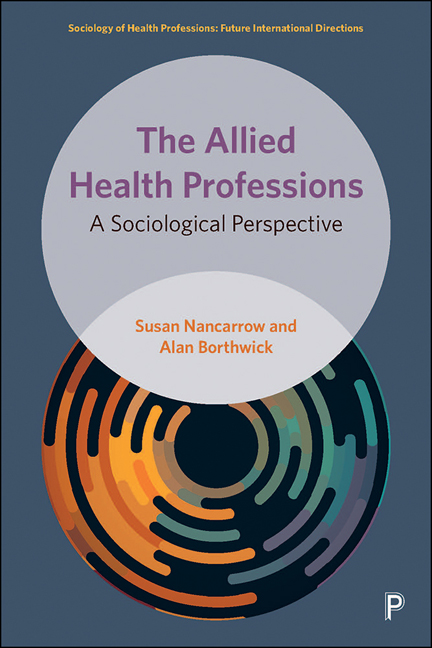Book contents
- Frontmatter
- Contents
- List of abbreviations
- Acknowledgements
- Editors’ overview
- Introduction
- 1 The allied health collective
- 2 Diversity in the allied health professions
- 3 The established allied health professions
- 4 Emerging allied health professions
- 5 The support workforce within the allied health division of labour
- 6 Specialisation in allied health
- 7 Post-professionalism and allied health
- Conclusion
- References
- Index
Conclusion
Published online by Cambridge University Press: 05 January 2022
- Frontmatter
- Contents
- List of abbreviations
- Acknowledgements
- Editors’ overview
- Introduction
- 1 The allied health collective
- 2 Diversity in the allied health professions
- 3 The established allied health professions
- 4 Emerging allied health professions
- 5 The support workforce within the allied health division of labour
- 6 Specialisation in allied health
- 7 Post-professionalism and allied health
- Conclusion
- References
- Index
Summary
In this book, we have illustrated that the allied health professions are innovative, responsive, nimble and able to adapt to a wide variety of changing population needs and organisational contexts. On the one hand, as illustrated by the example of the podiatric surgeons in Chapter 6, allied health professions have successfully used managerialism to contest one of the most highly protected domains of medicine – orthopaedic surgery. On the other, as the example of the OTA role suggests, managerialism is eroding the core philosophies of the allied health professions and replacing them with an emphasis on technically focused tasks and competencies. Further, where the dominant, neo-Weberian theories of the professions focus on the protection of a monopoly of knowledge, the allied health professions are actively and consensually involved in the disaggregation and codification of their work so that it can be transferred to other allied health professions and the support workforce.
Allied health professionals have also demonstrated that they can adapt to a range of different organisational and clinical contexts, adjusting their roles and responses accordingly. However, unlike their medical and nursing counterparts, which have large institutionalised hierarchies to support their roles, allied health professions are often moving outside their narrow clinical boundaries and across organisational and institutional settings without a clear structure to fortify them. Perhaps this reflects the shift from a pure profession towards a hybrid profession (Noordegraaf, 2007), which has flexible boundaries, adapts to a range of organisational contexts and responds to the needs of the clients with which they work. The implications of this shift for the allied health professions themselves are still unclear.
The value and meaning of the allied health collective
Despite the prolific use of the term ‘allied health’, our analysis brings us no closer to a unifying definition of the confederation of allied health professions. It is clear that allied health professionals are distinct from medicine and nursing; however, those professional boundaries are beginning to blur as allied health professions take on traditional medical roles, such as prescribing and point-of-care testing (Buss et al, 2019).
- Type
- Chapter
- Information
- The Allied Health ProfessionsA Sociological Perspective, pp. 191 - 202Publisher: Bristol University PressPrint publication year: 2021



